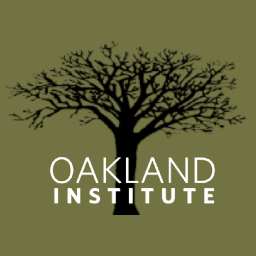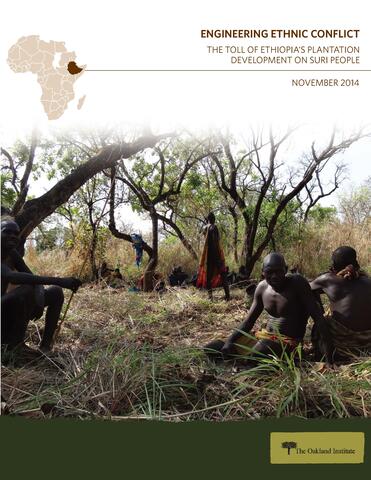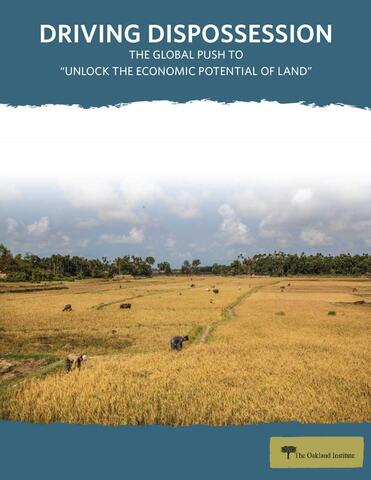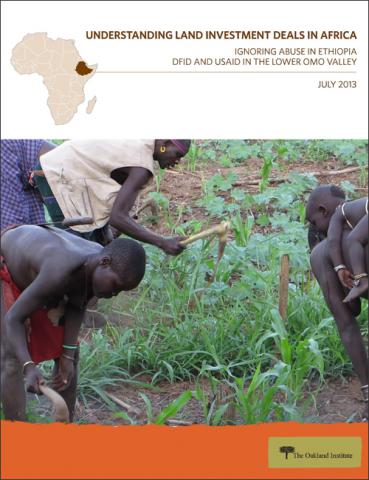Location
The Oakland Institute is a policy think tank whose mission is to increase public participation and promote fair debate on critical social, economic and environmental issues in both national and international forums.
The Oakland Institute’s trademark is to work in coalitions and networks to strengthen social movements, especially as we forge multi-cultural, cross-border and cross-class alliances. As a policy think tank our work is unique (in that we are bringing new approaches to social change including the awareness of economic, social and cultural rights) as we work with grass roots constituency (faith-based, farm workers, immigrant rights groups, Black farmers, among others) and help bridge policy think tanks with activist networks and social movements.
The Institute engages in three main areas of interrelated program work:
- Bringing a social and economic human rights lens to organizing and policy work
- Reframing the debate on security
- Building strategic alliances to strengthen popular struggles nationally and internationally
The Institute addresses this work through education and advocacy activities in national and international forums. Our aim is not just to come up with a list of new policy solutions but to reframe the basic terms on which public debate takes place. Our goal is to stimulate public discussion and debate while creating an informed citizenry that can craft a new vision of action for the future.
Members:
Resources
Displaying 21 - 25 of 37Engineering Ethnic Conflict: The Toll of Ethiopia's Plantation Development on Suri People
Recently dubbed “Africa’s Lion” (in allusion to the discourse around “Asian Tigers”), Ethiopia is celebrated for its steady economic growth, including a growing number of millionaires compared to other African nations. However, as documented in previous research by the Oakland Institute, the Ethiopian government’s “development strategy,” is founded on its policy of leasing millions of hectares (ha) of land to foreign investors.
Driving Dispossession: The Global Push to “Unlock the Economic Potential of Land”
Driving Dispossession: The Global Push to “Unlock the Economic Potential of Land,” sounds the alarm on the unprecedented wave of privatization of natural resources that is underway around the world. Through six case studies — Ukraine, Zambia, Myanmar, Papua New Guinea, Sri Lanka, and Brazil — the report details the myriad ways by which governments — willingly or under the pressure of financial institutions and Western donor agencies — are putting more land into so-called “productive use” in the name of development.
We Harvest – You Profit. African Land Ltd’s Land Deal in Sierra Leone
Includes what is ALL?, who owns ALL?, trouble at home, new findings, turning to new pastures as African Land reinvents itself. A cautionary tale of double deception. Investors were hoodwinked by the promise of high economic returns and may be holding onto a lease that lacks legal standing in Sierra Leone. Unclear if investors will receive any of their investment back, even if the company is forced to liquidate.
World Bank's Bad Business in Sierra Leone
Since 2004, the World Bank has provided continuous “investment climate advisory services” to Sierra Leone. Business reforms and Bank-piloted programs such as Sierra Leone Business Forum and the Sierra Leone Investment and Export Promotion Agency led to the World Bank classifying Sierra Leone among “the top 15 economies that improved their business regulatory environment the most” since 2005 and rank the country third in the regional “Protection of Investors” category.
UNDERSTANDING LAND INVESTMENT DEALS IN AFRICA
Southern Ethiopia’s Lower Omo Valley is one of the most culturally and biologically diverse areas in the world, yet the Ethiopian government is transforming more than 375,000 hectares (1450 sq. miles) of the region into industrial-scale plantations for sugar and other monocrops.






